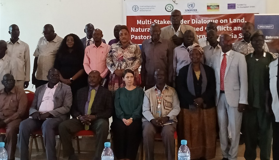At least 65 stakeholders drawn from the eight counties and two administrative areas in Eastern Equatoria State on Tuesday commenced a three-day dialogue on land, natural resources-based conflicts, and pastoral issues in Torit.
The multi-stakeholder dialogue, organized by the state peacebuilding ministry in partnership with the United Nations’ Food and Agriculture Organization (UNFAO) and UNMISS, with funding from the European Union (EU).
The dialogue will focus on identifying challenges and mapping conflict hotspots in greater Kapoeta, Torit, and Magwi counties, and also mapping complex land disputes, including pasture and water access, or control by communities.
Speaking during the opening of the dialogue, Sokiri James, the FAO deputy head of the field office, said dialogue can lead to early warning about and early response to conflict.
“Fostering dialogue and collaborative planning aims to contribute to early warning and early response mechanisms, reduce conflict risks, and promote gender sensitive peacebuilding in local communities,” he said. “By the end of the dialogue, we aim to develop a joint action plan that reflects and shares commitment to conflict mitigation and responsible resource management. We also hope to strengthen coordination among the stakeholders and generate recommendations for public and legal reforms.”
“Together we can build a future where land and resources are a source of prosperity and not conflict,” Sokiri added.
For his part, Angelo William Geri, the state minister of livestock and animal resources, expressed sadness over climate change, saying it has made the livestock sector vulnerable due to drought and flooding.
“Indeed, the livestock sector is vulnerable to the impact of climate change and resultant extreme weather conditions across the country and region. In South Sudan, it has affected the livestock sector due to the drought and occasionally, flooding,” he explained. “This extreme weather leads to losses in livestock investments, income, and livelihoods, and it has occasionally led to conflict because people struggle over meager resources. Also, the movement of livestock has led to the reemergence of traditional and new diseases and the spread of pests.”
Meanwhile, Governor Louis Lobong urged communities to embrace peace and said such dialogues will be fruitful if there is harmony.
“I came because I heard the people from the counties are coming and I wanted to pass a message of peace, because without peace, all that we are thinking will not come to pass, meaning we shall not become rich and we shall not be satisfied,” he said. “A farmer must cultivate without thinking about insecurity or being scared, and also so that you can go and sell your food. A herder needs to graze cattle in the bush without fear and return home without his cattle being raided.”




